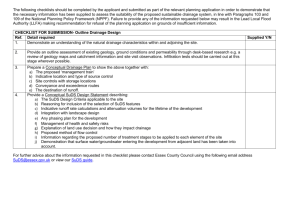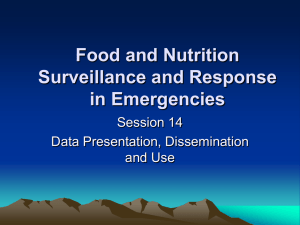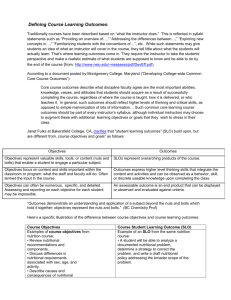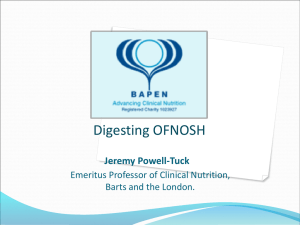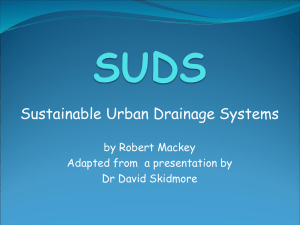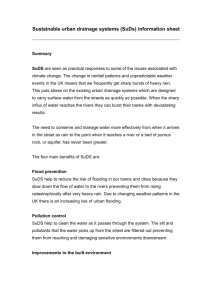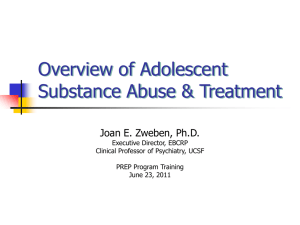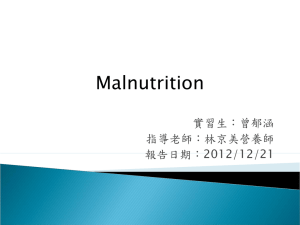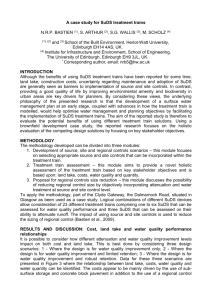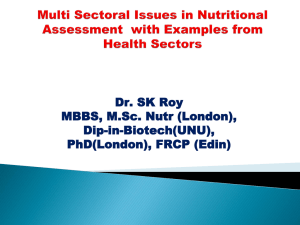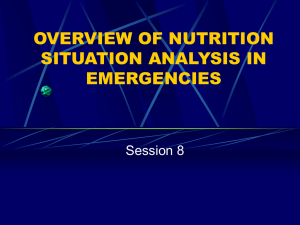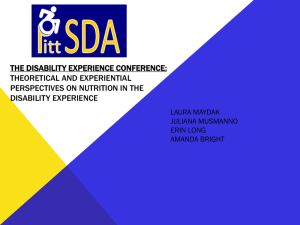Behavioral Health Nutrition: Nutrition & Addiction
advertisement
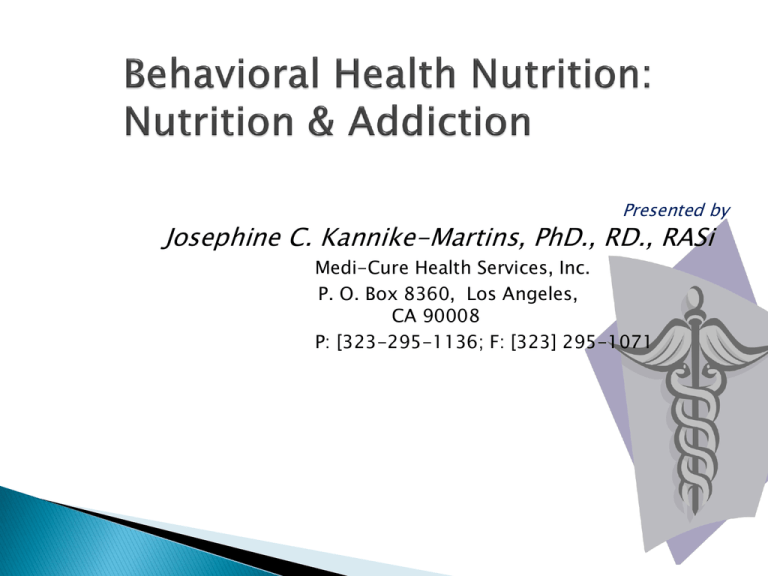
Presented by: Presented by Josephine C. Kannike-Martins, PhD., RD., RASi Medi-Cure Health Services, Inc. P. O. Box 8360, Los Angeles, CA 90008 P: [323-295-1136; F: [323] 295-1071 Examine the Implication of addiction on nutritional well being Strategies for intervention Create awareness Become an advocate Understand it’s prevalence within our population Terminology: Substance Use Disorders (SUDs) aka (Substance Abuse)/addiction 20% of total hospital costs in the U.S. are due to medical care caused by SUDs Up to 40% of all Americans in hospital beds are treated for complications of alcohol abuse & alcoholism One in every five Medicaid dollars spent on hospital care and one in five hospital daysattributed to SUDs Individuals who abuse alcohol, tobacco & other drugs are hospitalized twice as long as other individuals 75% of chronic pancreatitis is caused by alcohol abuse 65% of the strokes among young Americans are related to cigarette, cocaine or amphetamine use Youth under fifteen years of age are hospitalized longer for illness if they abuse psychoactive substances SUDs (all inclusive) psychoactive drugs/ OTC/Rx Nutrition & Addictions A Guide for Professionals: Ann S. Hatcher, EdD, RD (ret) CACIII, NCACII,2008 Direct effects Depletion of nutrient stores Malabsorption of nutrients Disrupts utilization of nutrients Indirect effects Irritation of the mucous lining of the stomach Diuresis, Constipation, decreases sensitivity of taste, altered perception of odors, decrease sense of feeling, decreases motivation & alterations of visual perception Malnutrition may be visible. Weight loss – may be the intended reason for using. Dry skin and hair. May be concealed by weight gain & the appearance of health Prevalence of fractures common among alcoholics Impaired nutritional status Emilio Gonzalez-Reimers et al., Vitamin R & Nutritional Status are Related to Bone Fractures in Alcoholics; Alcohol & Alcoholism, Vol. 46, N2., pp148-155, 201. Preoccupation with acquiring and using drugs Compulsion to use despite negative consequences High relapse rate regardless of negative consequences. Addiction is a chronic disorder lasting over time Effects on the body depends on substance of choice Major physical impact is on the hepatic system Regular use enables reward from the drug and decreases reward from non-drug related activity & controls major decision making High risk: - The elderly, adolescents, binge drinkers Possible individual difference in sensitivity to neurochemical reward Commonalities between SUDs & overeating associated with obesity SUDs & obesity aggravated stressors leading to dopamine-modulated neurobiological adaptation Positive correlation between alcohol & anthropometric markers of adiposity Davis C., Patte K, et al., From Motivation to Behaviour: A Model of Reward Sensitivity, Overeating, & Food Preferences in the Risk Profile for Obesity. Volkow N D, et al., How can Drug Addiction help us Understand Obesity? Nat. Neuroesci. 2005;8(5: 555-560. (PubMed: 15856062). C. Dumesnil et al., Alcohol Consumption Patterns & Body Weight; Annals of Nutrition Metabolism, 2013; 62:91-97. There are many nutrition-related consequences of SUDs Diet history – reveals changes in eating patterns Often ignored due to shortcuts Lacking the motivation to change or readiness for change Stage of change model The goal is to assist recovery/harm reduction Repair damage to health, mental, physical & emotional Treatment Programs do not always include nutritional assessment or nutrition education May not show nutritional deficiencies at admission, often develop nutritional health problems Good nutrition replenishes nutrient deficiencies Assessment information should drive the treatment plan. Working with high risk populations Collaboration of services with care providers Well designed health education Good nutrition & self-efficacy Diet & Exercise Crucial pathway: self-care & commitment to staying sober P. Bardadiri et al., Effect of Edu. Intervention on Nutritional Behavior in Alcohol-Dependent Patients, Alcohol & Alcoholism, Vol. 1, pp 77-79, 2011 David A. Wiss, Self-Efficacy & Nutrition: Promoting Behavior Change in Substance Abuse Recovery, BHN Newsletter, pp 12-13. Winter 2012. Questions/Answers Thanks for your participation!!
